美国医护人员大规模辞职
文 / 张佳莹
11/20/2021
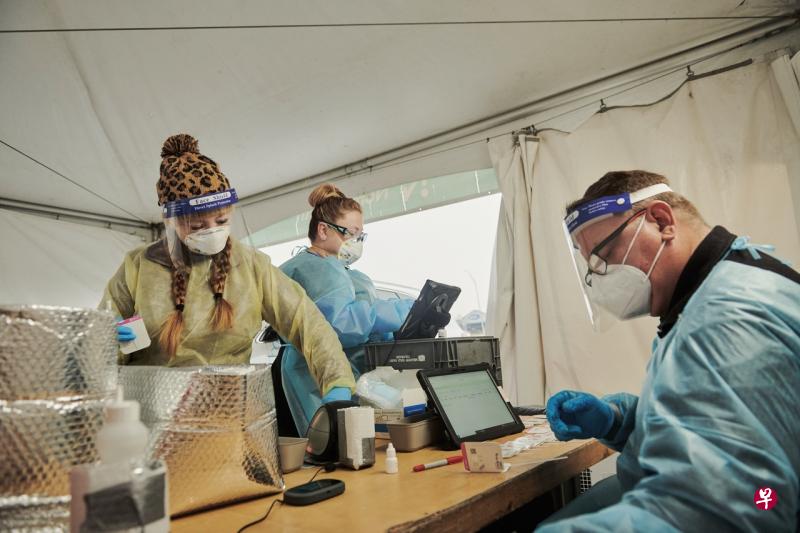
(早报讯)据美国福克斯新闻网周五(19日)报道称,冠病疫情之下,美国医护人员大规模辞职,自2020年2月以来,美国医疗卫生行业已流失约50万名员工。
根据《大西洋月刊》近期的一份报告,美国医疗卫生行业正面临“大出血”,自冠病疫情开始以来,每五名医护人员中就有一人辞职。根据美国劳工统计局的数据,自2020年2月以来,该行业流失了大约50万名员工。报告称,医护人员辞职的原因有很多。有些人受到了极大创伤,无法再工作;有些人是被迫离开。部分人是在感染冠病后遭受长期的副作用,失去了工作,还有许多人则是自己决定离开这个行业。
报告还指出,35%至54%的美国医护人员在疫情开始之前就已经感到疲惫不堪,被死亡、创伤和压力压得喘不过气来,这只是医护人员日常工作的一部分,但冠病疫情将这些(压力)放大,一些人变得士气低落,难以坚持。美国重症监护护士协会表示,一项调查显示,美国医疗卫生行业剩余的劳动力中,有31%的人已经考虑辞职;66%的急诊和重症监护护士已经考虑辞职。
报道称,美国的疫苗接种开始时给人们带来了疫情结束的希望,但随着德尔塔变种的肆虐,加上过早放松口罩令,疫苗接种率停滞不前,此前的希望很快破灭,医院再次变得不堪重负。许多医护人员告诉《大西洋月刊》,压垮他们的最后一根稻草不是病毒本身,而是对他们各自的医疗机构应对疫情感到非常不满,他们不得不在艰苦的条件下工作,没有什么发言权,他们不是简单地决定退出,而是真的要辞职。
WHY HEALTH-CARE WORKERS ARE QUITTING IN DROVES
About one in five health-care workers has left their job since the pandemic started. This is their story—and the story of those left behind.
By Ed Yong
11/20/2021
The moment that broke Cassie Alexander came nine months into the pandemic. As an intensive-care-unit nurse of 14 years, Alexander had seen plenty of “Hellraiser stuff,” she told me. But when COVID-19 hit her Bay Area hospital, she witnessed “death on a scale I had never seen before.”
Last December, at the height of the winter surge, she cared for a patient who had caught the coronavirus after being pressured into a Thanksgiving dinner. Their lungs were so ruined that only a hand-pumped ventilation bag could supply enough oxygen. Alexander squeezed the bag every two seconds for 40 minutes straight to give the family time to say goodbye. Her hands cramped and blistered as the family screamed and prayed. When one of them said that a miracle might happen, Alexander found herself thinking, I am the miracle. I’m the only person keeping your loved one alive. (Cassie Alexander is a pseudonym that she has used when writing a book about these experiences. I agreed to use that pseudonym here.)
Oct 8, 2021
The September jobs report shows that the unemployment rate fell to 4.8% and job openings are at a record high with wages increased again last month, as companies tried to attract new employees. But more than 25 million people quit their jobs in the first seven months of this year. And it’s now called “the great resignation.”
The senselessness of the death, and her guilt over her own resentment, messed her up. Weeks later, when the same family called to ask if the staff had really done everything they could, “it was like being punched in the gut,” she told me. She had given everything—to that patient, and to the stream of others who had died in the same room. She felt like a stranger to herself, a commodity to her hospital, and an outsider to her own relatives, who downplayed the pandemic despite everything she told them. In April, she texted her friends: “Nothing like feeling strongly suicidal at a job where you’re supposed to be keeping people alive.” Shortly after, she was diagnosed with post-traumatic stress disorder, and she left her job.
Since COVID-19 first pummeled the U.S., Americans have been told to flatten the curve lest hospitals be overwhelmed. But hospitals have been overwhelmed. The nation has avoided the most apocalyptic scenarios, such as ventilators running out by the thousands, but it’s still sleepwalked into repeated surges that have overrun the capacity of many hospitals, killed more than 762,000 people, and traumatized countless health-care workers. “It’s like it takes a piece of you every time you walk in,” says Ashley Harlow, a Virginia-based nurse practitioner who left her ICU after watching her grandmother Nellie die there in December. She and others have gotten through the surges on adrenaline and camaraderie, only to realize, once the ICUs are empty, that so too are they.
Some health-care workers have lost their jobs during the pandemic, while others have been forced to leave because they’ve contracted long COVID and can no longer work. But many choose to leave, including “people whom I thought would nurse patients until the day they died,” Amanda Bettencourt, the president-elect of the American Association of Critical-Care Nurses, told me. The U.S. Bureau of Labor Statistics estimates that the health-care sector has lost nearly half a million workers since February 2020. Morning Consult, a survey research company, says that 18 percent of health-care workers have quit since the pandemic began, while 12 percent have been laid off.
Stories about these departures have been trickling out, but they might portend a bigger exodus. Morning Consult, in the same survey, found that 31 percent of the remaining health-care workers have considered leaving their employer, while the American Association of Critical-Care Nurses found that 66 percent of acute and critical-care nurses have thought about quitting nursing entirely. “We’ve never seen numbers like that before,” Bettencourt told me. Normally, she said, only 20 percent would even consider leaving their institution, let alone the entire profession. Esther Choo, an emergency physician at Oregon Health and Science University, told me that she now cringes when a colleague approaches her at the end of a shift, because she fears that they’ll quietly announce their resignation too. Vineet Arora, who is dean for medical education at University of Chicago Medicine, says that “in meetings with other health-care leaders, when we go around the room, everyone says, ‘We’re struggling to retain our workforce.’ Nobody says, ‘We’re fine.’”
When national COVID hospitalizations fell in September and October, it was possible to hope that the health-care system had already endured the worst of the pandemic. But that decline is now starting to plateau, and in 17 states hospitalizations are rising. And even if the country dodges another surge over the winter, the health-care system is hemorrhaging from the untreated wounds of the past two years. “In my experience, physicians are some of the most resilient people out there,” Sheetal Rao, a primary-care physician who left her job last October, told me. “When this group of people starts leaving en masse, something is very wrong.”
Health-care workers, under any circumstances, live in the thick of death, stress, and trauma. “You go in knowing those are the things you’ll see,” Cassandra Werry, an ICU nurse currently working in Idaho, told me. “Not everyone pulls through, but at the end of the day, the point is to get people better. You strive for those wins.” COVID-19 has upset that balance, confronting even experienced people with the worst conditions they have ever faced and turning difficult jobs into unbearable ones.
In the spring of 2020, “I’d walk past an ice truck of dead bodies, and pictures on the wall of cleaning staff and nurses who’d died, into a room with more dead bodies,” Lindsay Fox, a former emergency-medicine doctor from Newark, New Jersey, told me. At the same time, Artec Durham, an ICU nurse from Flagstaff, Arizona, was watching his hospital fill with patients from the Navajo Nation. “Nearly every one of them died, and there was nothing we could do,” he said. “We ran out of body bags.”
Most drugs for COVID-19 are either useless, incrementally beneficial, or—as with the new, promising antivirals—mostly effective in the disease’s early stages. And because people who are hospitalized with COVID-19 tend to be much sicker than average patients, they are also very hard to save—especially when hospitals overflow. Many health-care workers imagined that such traumas were behind them once the vaccines arrived. But plateauing vaccination rates, premature lifts on masking, and the ascendant Delta variant undid those hopes. This summer, many hospitals clogged up again. As patients waited to be admitted into ICUs, they filled emergency rooms, and then waiting rooms and hallways. That unrealized promise of “some sort of normalcy has made the feelings of exhaustion and frustration worse,” Bettencourt told me.
Health-care workers want to help their patients, and their inability to do so properly is hollowing them out. “Especially now, with Delta, not many people get better and go home,” Werry told me. People have asked her if she would have gone to nursing school had she known the circumstances she would encounter, and for her, “it’s a resounding no,” she said. (Werry quit her job in an Arizona hospital last December and plans on leaving medicine once she pays off her student debts.)
COVID patients are also becoming harder to deal with. Most now are unvaccinated, and while some didn’t have a choice in the matter, those who did are often belligerent and vocal. Even after they’re hospitalized, some resist basic medical procedures like proning or oxygenation, thinking themselves to be fighters, only to become delirious, anxious, and impulsive when their lungs struggle for oxygen. Others have assaulted nurses, thrown trash around their rooms, and yelled for hydroxychloroquine or ivermectin, neither of which has any proven benefit for COVID-19. Once, Americans clapped for health-care heroes; now “we’re at war with a virus and its hosts are at war with us,” Werry told me.
Beyond making workdays wretched, these experiences are inflicting deep psychological scars. “We want to be rooting for our patients,” Durham told me, “but anyone I know who’s working in COVID has zero compassion remaining, especially for people who chose not to get the vaccine.” That’s why he has opted to do travel-nursing stints, which are time-limited and more lucrative than staff jobs: “It just isn’t worth it to do the job for less than the most I can get paid,” he said. He’s still providing care, but he finds himself emotionally detached, and unsettled by his own numbness. For a health-care worker, being shaken by a patient’s death comes with the job. Finding yourself unmoved is almost worse.
Many have told me that they’re bone-weary, depressed, irritable, and (unusually for them) unable to hide any of that. Nurses excel at “feeling their feelings in a supply closet or bathroom, and then putting their game face back on and jumping into the ring,” Werry said. But she and others are now constantly on the verge of tears, or prone to snapping at colleagues and patients. Some call this burnout, but Gerard Brogan, the director of nursing practice at National Nurses United, dislikes the term because “it implies a lack of character,” he told me. He prefers moral distress—the anguish of being unable to take the course of action that you know is right.
Health-care workers aren’t quitting because they can’t handle their jobs. They’re quitting because they can’t handle being unable to do their jobs. Even before COVID-19, many of them struggled to bridge the gap between the noble ideals of their profession and the realities of its business. The pandemic simply pushed them past the limits of that compromise.
The united states uses the rod of Asclepius—a snake entwined around a staff—as a symbol of medicine. But the pandemic suggests that the more fitting symbol might be the Ouroboros, a snake devouring its own tail.
Several health-care workers told me that, amid the most grueling working conditions of their careers, their hospitals cut salaries, reduced benefits, and canceled raises; forced staff to work more shifts with longer hours; offered trite wellness tips, such as keeping gratitude journals, while denying paid time off or reduced hours; failed to provide adequate personal protective equipment; and downplayed the severity of their experiences.
The American Hospital Association, which represents hospital administrators, turned down my interview request; instead, it sent me links to a letter that criticized anticompetitive pricing from travel-nursing agencies and to a report showing that staff shortages have cost hospitals $24 billion over the course of the pandemic. But from the perspective of health-care workers, those financial problems look at least partly self-inflicted: Many workers left because they were poorly treated or compensated, forcing hospitals to hire travel nurses at greater cost. Those nurses then stoke resentment among full-time staff who are paid substantially less but are often asked to care for the sickest patients. And in some farcical situations, “hospitals hired their own staff back as travel nurses and paid them higher rates,” Bettencourt said.
Whatever the intentions behind these decisions, they were the final straw for the many health-care workers who told me that they left medicine less because of COVID-19 itself and more because of how their institutions acted. “I’ve been a nurse 45 years and I’ve never seen this level of disaffection between clinicians and their employers,” Brogan told me. The same is true across almost every sector of the U.S. Record-breaking numbers of Americans left their jobs this April—and then again in July and August. This “Great Resignation,” as my colleague Derek Thompson wrote, “is really an expression of optimism that says, We can do better.”
The culture of medicine makes it hard for health-care workers to realize that. Most enter medicine “as a calling,” Vineet Arora told me, which can push them to sacrifice ever more of their time, energy, and self. But that attitude, combined with taboos around complaining or seeking mental-health help, can make them vulnerable to exploitation, blurring the line between service and servitude. Between 35 and 54 percent of American nurses and physicians were already feeling burned out before the pandemic. During it, many have taken stock of their difficult working conditions and inadequate pay and decided that, instead of being resigned, they will simply resign.
Molly Phelps, an emergency doctor of 18 years, considered herself a lifer. Her medical career had cost her time with her family, wrecked her circadian rhythms, and taxed her mental health, but it offered so much meaning that “I was willing to stay and be miserable,” she told me. But after the horrific winter surge, Phelps was shocked that her hospital’s administrators “never acknowledged what we went through,” while many of her patients “seemed to forget their humanity.” Medicine’s personal cost seemed greater than ever, but the fulfillment that had previously tempered it was missing. On July 21, during an uneventful evening spent scrolling through news of the Delta surge, Phelps had a sudden epiphany. “Oh my God, I think I’m done,” she realized. “And I think it’s okay to walk away and be happy.”
America’s medical exodus is especially tragic because of how little it might have taken to stop it. Phelps told me that if her workplace “had thrown a little more of a bone, that would have been enough to keep me miserable for 13 more years.” Some health systems are starting to offer retention bonuses, long-overdue raises, or hazard pay. And the next generation of health-care workers doesn’t seem to be deterred. Applications to medical and nursing schools have risen during the pandemic. “That workforce is apparently seeing the best of us, and maybe their vision and energy is what we need to make us whole again,” Esther Choo told me.
But today’s students will take years to graduate, and the onus is on the current establishment to reshape an environment that won’t immediately break them, Choo said. “We need to say, ‘We got this wrong, and despite that, you’re willing to invest your lives in this career? What an incredible gift. We can’t look at that and change nothing.’”
The health-care workers who have stayed in their jobs now face a “crushing downward spiral,” Choo told me. Each resignation saddles the remaining staff with more work, increasing the odds that they too might quit. They don’t resent their former colleagues, but some feel that medicine’s social contract, wherein health-care workers show up for one another through tragedy, is fraying. Before the pandemic, “I knew exactly who I would be working with in every single role,” Choo said. “There was a lot of unspoken communication, and my shifts were so smooth.” But with so many people having left, the momentum that comes from trust and familiarity is gone.
Expertise is also hemorrhaging. Many older nurses and doctors have retired early—people who “know that one thing that happened 10 years ago that saved someone’s life in a clutch situation,” Cassie Alexander said. And because of their missing experience, “things are being missed,” Artec Durham added. “The care feels frantic and sloppy even though we’re not overrun with COVID right now.” Future patients may also suffer because the next generation of health-care workers won’t inherit the knowledge and wisdom of their predecessors. “I foresee at least three or four years post-COVID where health-care outcomes are dismal,” Cassandra Werry told me. That problem might be especially stark for rural hospitals, which are struggling more with staff shortages and unvaccinated populations.
This decline in the quality of health care will likely occur as demand increases. Even in the unlikely event that no further COVID-19 infections occur, the past months have left millions with long COVID and other severe, chronic problems. “I’m seeing a lot of younger people with end-stage cardiac or neurological disease—people in their 30s and 40s who look like they’re in their 60s and 70s,” Vineet Arora told me. “I don’t think people understand the disability wave that’s coming.”
Hospitals are also being flooded by people who don’t have COVID but who delayed care for other conditions and are now in terrible shape. “People are coming in with liver failure, renal failure, and heart attacks they sat on for weeks,” Durham told me. “Even if you take COVID out of the equation, the place is a mess with sick patients.” This pattern has persisted throughout the pandemic, trapping health-care workers in a continuous, nearly two-year-long peak of either COVID or catch-up care. “It doesn’t feel great between surges,” Choo told me. “Something always replaces COVID.”
Throughout the pandemic, commentators have looked to COVID-hospitalization numbers as an indicator of the health-care system’s state. But those numbers say nothing about the dwindling workforce, the mounting exhaustion of those left behind, the expertise now missing from hospitals, or the waves of post-COVID or non-COVID patients. Focusing on COVID numbers belies how much harder getting good medical care for anything is now—and how long that trend could potentially continue. Several health-care workers told me that they are now more concerned about their own loved ones being admitted to the hospital. “I’m worried about the future of medicine,” Sheetal Rao said. “And I think we all should be.”
Alife outside medicine can be hard for people who have built their identities within it. For some, it’s like returning from war and mingling with civilians who don’t understand what you went through. “I met up with some friends who are really bright people but who said, ‘Wait, the winter was traumatizing?’” Molly Phelps told me. She thinks that “health-care workers are either preparing for work, at work, or recovering from work,” which leaves little time for talking about their experiences. And those who do talk can hit a brick wall of pandemic denial.
Cassie Alexander also struggled with the fact that she was struggling. “I built my whole identity around being the toughest person I knew, and it was shattering to admit that I was broken and needed help,” she said. She returned to work last week, partly for financial reasons and partly to prove to herself that she can still do it. Others have peeled off to less intense medical roles. And some have no plans to return at all—but feel guilty about abandoning their colleagues and patients. “People going into medicine want to be of service in moments of crisis, so it was hard to watch [further surges] and feel like I was on the sidelines,” Lindsay Fox told me.
Some former health-care workers have found new purpose in tackling health problems at a different scale. Sheetal Rao has helped launch an environmental nonprofit that plants trees in Chicago, especially in poorer neighborhoods that lack them. “In primary care, we focus on prevention, but that’s also about advocating for cleaner air so I’m not just sending my patients home with an inhaler,” she told me.
Dona Kim Murphey, a former physician who now has long COVID, started a political action committee to get doctors into office as part of a plan to reform medicine. “I was growing increasingly concerned about how inhumane our profession is,” she told me. “There’s no culture of physicians organizing and fighting for their rights, but that’s something we should think about to leverage the outrage and frustration that people have.” For the same reason, Nerissa Black, a nurse in Valencia, California, is staying in medicine. She was so disillusioned by her hospital’s handling of the pandemic that she almost left nursing entirely. But she changed her mind to continue being part of the National Nurses United union and advocating for better working conditions. For example, California is the only state that caps the ratio of patients to nurses, and she wants to see similar limits nationwide. “I feel more resolute,” she told me.
Phelps, meanwhile, found the last thing she expected—a sense of peace. She used to scoff when she heard people say that you’re more than your job. “I thought, That may be true for all you nonmedical laypeople, but I am a doctor and it’s who I am,” she told me. And yet, she has experienced no identity crisis. After her last shift this September, she was on a random weekend trip with her children when, in the middle of a pumpkin patch, she started sobbing. “I realized that I was happy, and I hadn’t experienced that in almost two years,” she told me. “I’m not sure I can ever see myself going into an ER again.”
Pentagon to respond “appropriately” after Oklahoma Guard moves not to follow vaccine mandate
By Erin Doherty
11/14/2021
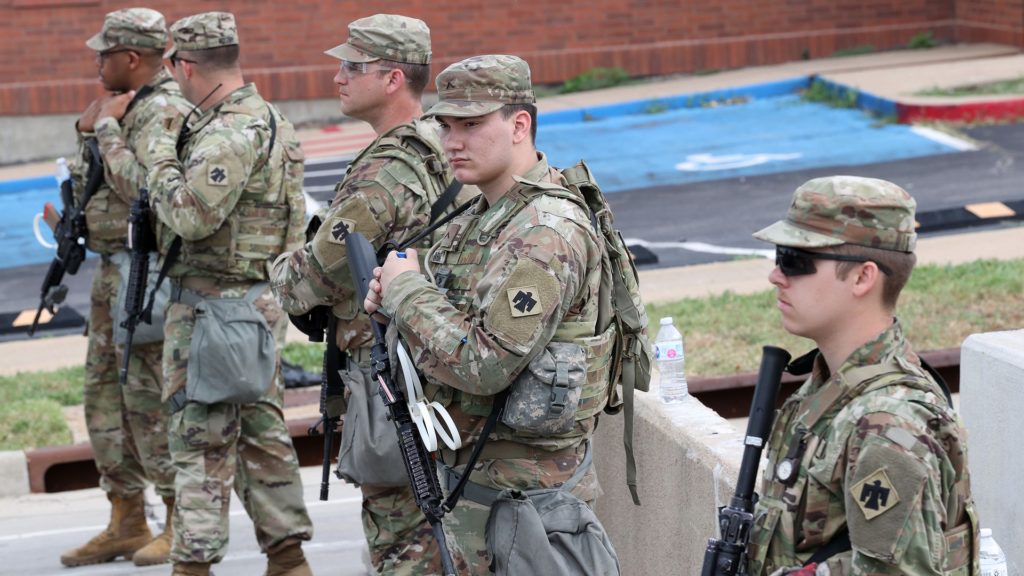
The Department of Defense will respond “appropriately” to a decision this week by the Oklahoma National Guard to rescind the Pentagon’s requirement for service members to receive the COVID-19 vaccine.
Driving the news: “We are aware of the memo issued by the Oklahoma Adjutant General regarding COVID vaccination for Guardsmen and the governor’s letter requesting exemption. We will respond to the governor appropriately,” Pentagon spokesman John Kirby told Axios in a statement.
- “That said, Secretary Austin believes that a vaccinated force is a more ready force. That is why he has ordered mandatory vaccines for the total force, and that includes our National Guard, who contribute significantly to national missions at home and abroad,” Kirby added.
State of play: The Pentagon’s statement comes after Brig. Gen. Thomas Mancino, who now oversees the Oklahoma National Guard, “rescinded” the requirement.
- Mancino cited a written request from the governor to Defense Secretary Lloyd Austin asking DOD to “immediately consider suspending the COVID-19 vaccine requirement for national guardsmen in Oklahoma.”
- Oklahoma Gov. Kevin Stitt (R) is “awaiting an decision” from the Defense secretary, Mancino wrote in the memo dated Thursday
- “No negative administrative or legal action will be taken against Guardsmen who refuse the COVID-19 vaccine,” according to the memo.
Nov 14, 2021
The big picture: Mancino earlier this week was selected by Stitt to replace Gen. Michael Thompson, who had supported COVID-19 vaccinations and said that members who do not receive the vaccine would be advised on alternative options.
- Thompson told reporters on Thursday that he learned he’d been relieved of duty via social media.
- A spokesperson for Stitt, who has vocally opposed the vaccine requirement for Oklahoma National Guard members, told AP that Mancino’s hire was not due to the vaccination policy.
- “The governor had been exploring making a change for a number of months, and Thompson had submitted his resignation” in October to take effect in January, spokesperson Carly Atchison said, per AP.
- Thompson told the Tulsa World that the governor had asked him to resign in October but that they agreed he would remain in place until January.
New vaccine mandate bans foreign visitors who got the wrong shot
We spoke with a couple separated by the new rule
By Rob Manch
11/12/2021
PORT CHARLOTTE — Imagine being fully-vaccinated against COVID-19 and still being told you can’t get on an airplane.
That’s the reality this week for millions of people across the world, thanks to a new proclamation signed by President Joe Biden. Foreign nationals now have to be vaccinated with an approved vaccine in order to travel to the United States.
“It’s very frustrating because there’s not a timeline to it,” said Daniela Zamuvio, who is now stuck in Mexico because of the new proclamation.
We met up with her boyfriend, Jason Hayner, who lives in Port Charlotte and we spoke with Zamuvio in a Zoom call on his laptop. That’s how they have to stay in touch for now.
“I couldn’t even make a guess as to when I could have Daniela in the states with me,” said Hayner.
Zamuvio can’t be here because the proclamation says foreign nationals can’t fly to the United States if they don’t have an approved vaccine.
“Her vaccine that she received from the Mexican Government back in May is the CanSino vaccine, which is not approved by the CDC,” said Hayner.
The CanSino vaccine was developed in China and has been approved for use in nine countries around the world.
But the U.S. isn’t one of them, and that meant Zamuvio had to cancel her flight last weekend.
“It hit me and I was like oh, I don’t think I’ll be able to travel, and then we had to call everything off,” said Zamuvio.
And Zamuvio isn’t alone. People who got Russia’s Sputnik V vaccine are in the same boat.
“It’s millions of people that are being affected by this and not being allowed to visit their friends and family that reside in the U.S.” said Hayner.
With millions of people now facing these new restrictions, a professor at Florida Gulf Coast University tells us the new restrictions could begin to have an impact on businesses you visit every day. Professor Thomas Felke said areas like Southwest Florida, that rely heavily on the service industry, could start to quickly feel the effect of these restrictions.
“Things like retail, landscaping, all of these types of service-related industries that, we know that that’s where a lot of our workforce migration comes from,” said Felke.
And even if Zamuvio wanted to get one of the approved vaccines, there isn’t any data yet on the health impacts of mixing-and-matching with CanSino.
So for now, Hayner and Zamuvio have to settle for a screen.
“If somebody can give me a solution of what to do with my case, because not being able to travel is not one of them,” said Zamuvio.
There’s another part of the proclamation Zamuvio and Hayner find unfair. It includes a list of 50 countries that are exempted from the rule, because it’s hard to get access to vaccines in those places.
So people in countries like Libya or Afghanistan can travel to the U.S. unvaccinated as long as they test negative for COVID-19, but people like Zamuvio are stuck.
The list of approved vaccines for travel to the U.S. are:
- Pfizer-BioNTech
- Moderna
- AstraZeneca
- Covaxin
- Covishield
- BIBP/Sinopharm
- Sinovac
- Janssen/J&J
Covid-19 Vaccine Injuries/Deaths
11/06/2021
Rumble — Roundtable discussion with vaccine injured and medical experts on federal vaccine mandates and the importance of health care freedom.
美国陆军飞行医官特蕾莎中校关于新冠疫苗的证词
By 萧笙客
11/06/2021
11月2日,飞行医官特蕾莎·朗中校在约翰逊参议员主持的关于新冠疫苗的圆桌会议上的作证。
美国德州胡德堡陆军基地负责四千名陆军飞行旅官兵身体健康和飞行安全的军医特蕾莎反对对官兵、特别是飞行员强制性注射疫苗,向法院提出的临时禁令书写的补充材料。
Sen. Johnson hosts panel highlighting people claiming to be harmed by COVID-19 vaccines
By WEAU 13 News
11/06/2021
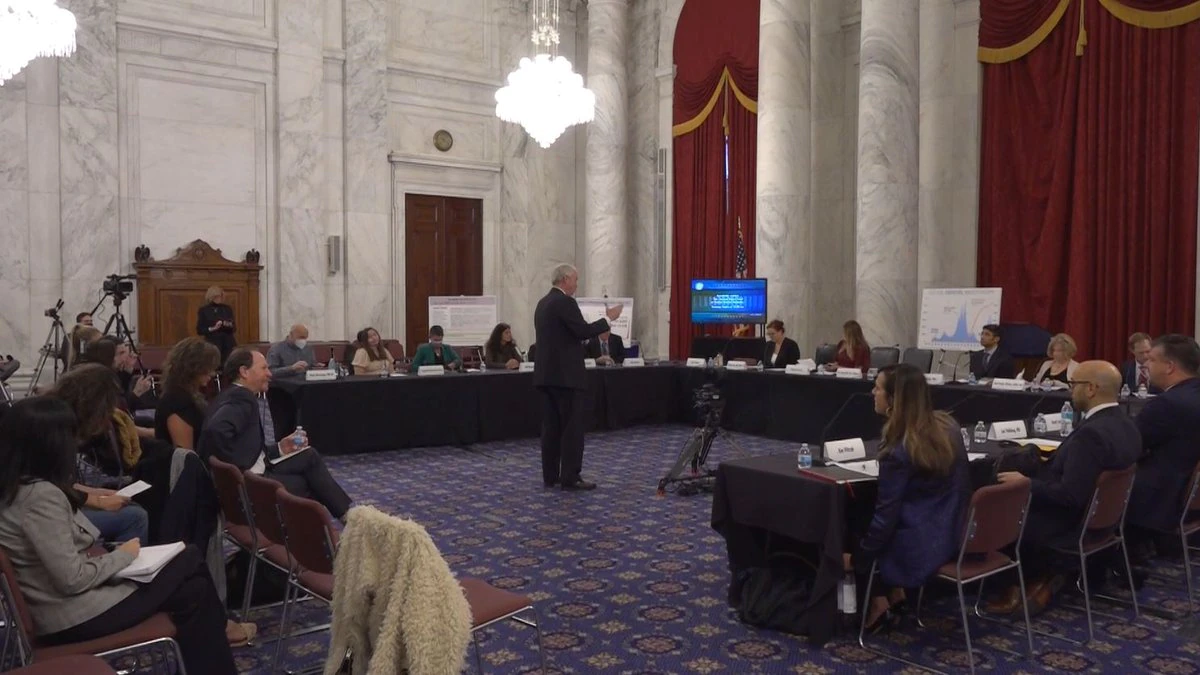
WASHINGTON, D.C. (WEAU) – Wisconsin Senator Ron Johnson is giving a stage to people who claim they were harmed by COVID-19 vaccinations.
Tuesday, Johnson held a roundtable with several people who say they or a loved one experienced life-altering side-effects from various COVID vaccinations.
One panelist, who says she experienced adverse side effects from the vaccine, called for a federal safety net for others who are also injured.
Another woman at the meeting claimed that those who catch COVID receive medical help, while those who have adverse side effects to vaccines are ignored.
The panel included researches and doctors who generally agreed vaccines have a role in fighting the pandemic, but also cautioned against mandating them.
Johnson said the panel is not about creating fear or increasing vaccine hesitancy, but says federal health officials aren’t being honest when they say the vaccines are safe and effective, and shouldn’t be mandated.
“I had COVID,” Johnson said. “I’ve had my antibodies tested as my doctor told me. I’ve got a whopping level of antibodies.”
Johnson also spoke about his personal vaccination decision.
“Again, natural immunity should be strong, pretty long-lasting, which is the case of very, you know, many, many illnesses, many viruses,” Johnson said. “And so there’s no reason for me to get a vaccine.”
A Centers for Disease Control and Prevention fact page maintains the vaccines are safe and effective. It also acknowledges the existence of some of the adverse effects discussed at Johnson’s roundtable, and says COVID vaccines are under the most intense safety monitoring in U.S. history.
Survey: Majority of Federal Employees Disagree With Biden’s Vaccine Mandate
Comments submitted as part of the survey show a diversity of thought on the requirement.
By COURTNEY BUBLÉ
he majority of federal employees recently surveyed (53%) strongly or somewhat disagreed with the Biden administration’s COVID-19 vaccine mandate for federal employees, while 44% strongly or somewhat agreed with it.
The Government Business Council, the research arm of Government Executive, sent a survey between October 27 and November 2 to Government Executive and Defense One readers, which drew 3,186 respondents. The survey had a 95% confidence level and margin of error of +/- 3%; the vast majority of respondents currently work for a federal agency but the results did include some retirees and congressional and private sector workers. President Biden announced the mandate on September 9 and the deadline is November 22.
“I am not pro or anti-vaccine, I am pro-choice,” wrote one federal employee in the comments section. “It should be a choice not a mandate, last I knew this was a free country.” Anonymous comments submitted as part of the survey show the diversity of thought on the mandate as well as the nuance of arguments on both sides.
Thirty-percent of respondents said they thought the vaccine mandate will be slightly or moderately effective in protecting the federal workforce from the coronavirus; 42% thought it will be very or extremely effective and 29% thought it will not be effective.
“The vaccine mandate is most likely legal. It’s also probably effective,” said a respondent. “It, however, does not mean the federal [government] should have the power to force adults and the civilian workforce to get a shot that they don’t want.”
The mandate requires all federal employees to get vaccinated against COVID-19 by November 22, or claim a religious or medical exemption. Those who decline vaccination and whose agencies deny their exemption requests will face progressive discipline, up to removal from the federal service.
Another respondent said, “the mandate will not be effective if the many false religious exemptions are approved,” because “most are not sincerely held beliefs, but just people that don’t want to get their vaccine.”
A different person said, “A coworker’s choice not to be vaccinated increases my potential exposure to COVID, potentially increases my workload if I have to cover for them if they are out ill and increases the cost of [Federal Employees Health Benefits]/Medicare.”
The survey looked at the difference of views among those on full telework compared to those going into the office at least one day a week. The chart below shows approval and disapproval levels based on that status, with those going into the office at least once a week more likely to strongly disapprove of the mandate.
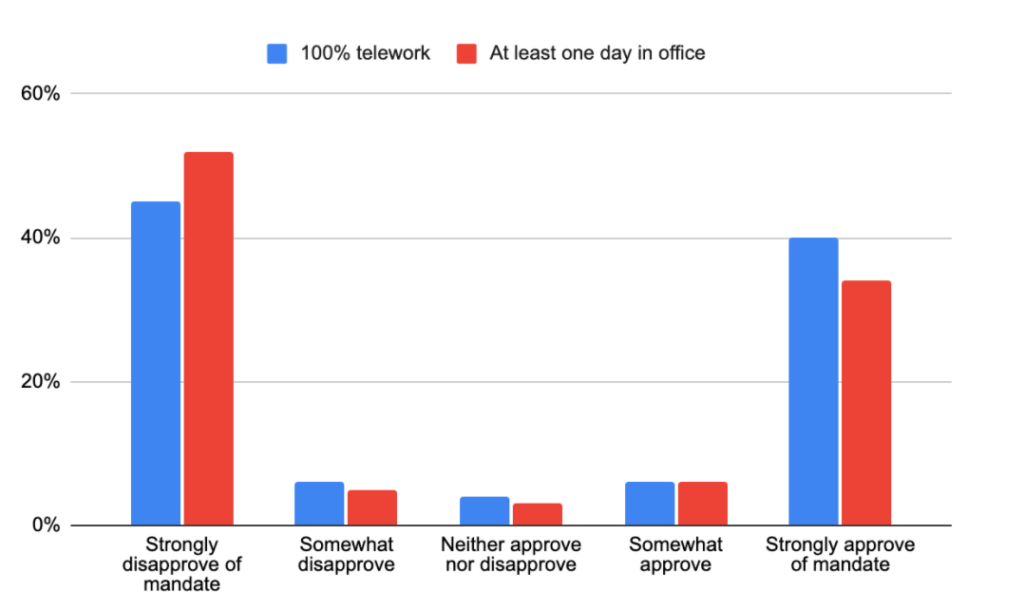
“If you can do your job, i.e. telework, without contacting others there is no reason to be vaccinated,” said one federal employee in the comments section. “It is the individual’s body and they should have the right to decide what is done to it without fearing economic ruin.”
Another said, “I worked and put the protocols in to keep everyone safe. I worked on the front lines for the last two years and now you want to fire me?”
One respondent who said they work for the Agriculture Department’s Farm Service Agency said they love their job and customers they serve, “but lately I do not feel the agency has my back or appreciates the work our agency does. After being on the front lines, figuring out telework, changing the way our agency goals are achieved I feel the employees deserve a little more than a ‘do it or get out policy.’ ”
As for the ability to enforce a vaccine mandate, 50% of respondents strongly or somewhat disagreed that the federal government has the authority to enforce the requirement, while 46% somewhat or strongly agreed. There were no major differences in responses from managers and non-managers to this question; however, there were some differences among those in different work environments, as shown below.

The Justice Department’s Office of Legal Counsel issued a legal opinion in July that says federal law doesn’t prohibit public and private entities from mandating coronavirus vaccines, even if those vaccines do not yet have full authorization from the Food and Drug Administration. Also, the Equal Employment Opportunity Commission issued a similar decision in May, which it updated in October.
As for regions, the area with the highest approval rating (54%) of the mandate was the D.C. metro area, which is where federal agency headquarters are concentrated. Respondents living in the Southwest had the highest disapproval rating.
“The D.C. power brokers are using us as pawns,” said a respondent.
While not a question in the survey, many raised concerns in the comments section about loss of employees due to the mandate.
“Is the federal government prepared to lose 20-30% of its workforce to retirements, resignations or terminations?” said one respondent.
“I will retire from federal service if I am threatened with discipline/firing,” said another. “ I am proud of my military service (Vietnam veteran) and federal service (FBI and [Internal Revenue Service]) and continually received ‘outstanding’ performance evals as GS-14. The federal mandate is morally wrong.”
Someone else said, “this is a train wreck, but may provide promotion opportunities for the younger workforce.”
However, there were also several comments encouraging vaccinations. “I sincerely appreciate efforts to get our team vaccinated,” said one person. “I am grateful for the mandate and wish it had come sooner.”
For comparison, a recent survey from Qualtrics, an experience management company, found that the majority of respondents (58%) supported vaccine mandates from either employers or the federal government.
“Employees in the [technology and information technology] industry are the most supportive of federal vaccine mandates compared to those who work in health care, retail and government,” said Qualtrics. “Roughly a quarter of government, health care, and private employees oppose mandates that would apply to them.”
Overall, 42% of respondents want their company leaders to enforce the mandate, while 39% do not, the Qualtrics survey found. That survey was done between October 12 and 15. There were 1,309 respondents who were chosen from a randomized panel and deemed eligible if they live in the United States, are an adult and are at least part-time employees.
Government Executive previously reported about reactions to the mandate from NASA, Federal Bureau of Prisons and other federal employees. While some agencies have shared their vaccination levels with reporters, lawmakers or the public, the levels are not known for all. Top House Republicans are seeking those numbers by November 10.
In one example, as of late October, several intelligence agencies had at least 20% of their workforce unvaccinated, with some as high as 40%, said Rep. Chris Stewart, R-Utah, who is a member of the House Permanent Select Committee on Intelligence, the Associated Press reported on Friday. He cited information that the Biden administration gave to the committee, but hasn’t released publicly, and didn’t name the specific agencies since the full results were classified.
Biden admin considering vaccine mandate for businesses with fewer than 100 employees
OSHA rule for big businesses forces employees to be vaccinated or wear masks and get weekly COVID-19 tests
By Tyler Olson | FOX Business
11/05/2021
The Occupational Safety and Health Administration (OSHA) says it is “seeking comment” about whether businesses with fewer than 100 employees should be subject to the COVID-19 vaccine and testing mandate it is implementing on big businesses.
OSHA’s requirement will force businesses with more than 100 employees to mandate vaccines or else their employees will need to wear masks and be tested for COVID-19 weekly. It will go into effect Jan. 4.
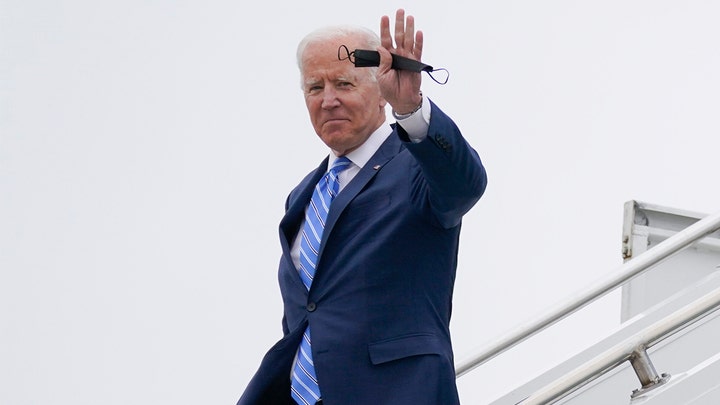
But according to a summary released by OSHA, it appears to be considering implementing the rule for small businesses as well.
“OSHA is confident that employers with 100 or more employees have the administrative capacity to implement the standard’s requirements promptly, but is less confident that smaller employers can do so without undue disruption,” the summary says. “OSHA needs additional time to assess the capacity of smaller employers, and is seeking comment to help the agency make that determination.”
The same language is included in the Federal Register page for the vaccine rule.

A Department of Labor spokesperson told FOX Business Friday that it is indeed considering whether to extend the vaccine or mask and testing mandate to businesses with fewer than 100 workers.
“OSHA chose a 100-employees threshold at this time because the agency is confident that employers with 100 or more employees have the administrative capacity to implement the standard’s requirements promptly,” the spokesperson said. “Because the emergency situation required OSHA to act quickly, the information immediately available to the agency did not allow it to confidently assess the impact on smaller firms.”
The spokesperson added: “OSHA will consider whether to extend the rule to smaller firms in the public rulemaking that begins with the publication of this emergency rule.”
Raytheon CEO warns company could lose ‘several thousand’ employees over vaccine mandate
By Mike Brest
10/27/2021
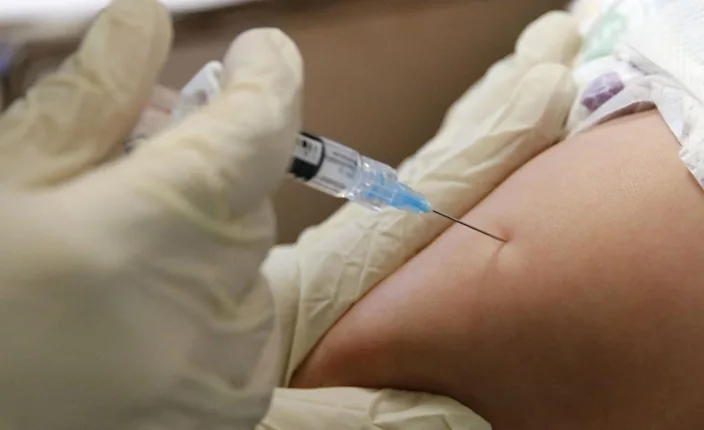
Raytheon Technologies’s top boss warned that the U.S. aerospace and defense company will lose thousands of employees who have thus far refused to comply with the COVID-19 vaccine mandate.
“So, we’re going to be faced on Dec. 8 with a choice. We’re going to potentially lose several thousand people who refuse to be vaccinated,” Raytheon CEO Greg Hayes said in a CNBC interview on Tuesday. “Now, this is a tough thing, but we are preparing for it.”
Hayes also said that 83% of the company, which has a total workforce of roughly 125,000 U.S. employees, according to Reuters, is already vaccinated while another 6% are “in the process of being vaccinated.”
Additionally, there is another 3% of employees who are seeking either a religious or medical exemption, while another 3% have said they don’t intend to receive the vaccine, the CEO added, though he did not address the status of the employees who do not fall into those categories.
The company has already begun hiring people to fill the upcoming vacancies, Hayes said.
Raytheon had issued a companywide mandate requiring vaccination by Jan. 1, but that order was usurped when President Joe Biden declared that all federal contractors must receive the vaccine by Dec. 8.
Hayes’s comments came the same day Alabama Republican Sen. Tommy Tuberville sent a letter to the White House claiming that Biden’s “federal contractor vaccine mandate will have negative effects on our national security” and called on the president “to remove — or, at a minimum, delay and clarify — vaccination requirements on private companies and academic research institutions that are actively supporting the Department of Defense.”
Similarly, nearly a dozen Republican lawmakers on the House Armed Services Committee petitioned the White House and Defense Secretary Lloyd Austin to reverse the Pentagon’s vaccine mandate for contractors over fears that it could lead to supply chain issues.
Roughly 100 employees at United Launch Alliance, a Lockheed Martin and Boeing joint venture that contracts to both the Pentagon and NASA, walked off the job Monday over the federal government’s vaccine mandates and pledged to continue protesting in the days leading up to the deadline to be vaccinated.
Former WSU football coach Nick Rolovich to sue university over firing after refusing vaccine
According to a press release sent by his attorney, Rolovich is accusing WSU Athletic Director Pat Chun of “discriminatory and vindictive behavior.”
By KREM Staff
10/20/2021
PULLMAN, Wash. — Former Washington State University football coach Nick Rolovich was fired Tuesday, Oct. 19 after refusing to be vaccinated against COVID-19 and now he plans to sue the university.
According to his lawyer, Rolovich will be taking legal action against WSU and all parties responsible for his termination. The decision to terminate Rolovich came after his request for a religious exemption from the vaccine was denied by the WSU. According to his lawyer, WSU “indicated that even if the exemption had been granted, no accommodation would have been made.”
Rolovich is accusing WSU Athletic Director Pat Chun of “discriminatory and vindictive behavior,” according to the statement from his lawyer, Brian Fahling.
“Since at least early April, it became clear that Chun had already determined that Coach Rolovich would be fired,” Fahling says. “Chun’s animus towards Coach Rolovich’s sincerely held religious beliefs, and Chun’s dishonesty at the expense of Coach Rolovich during the past year is damning and will be thoroughly detailed in litigation.”
In the statement, Fahling says, “Chun’s discriminatory and vindictive behavior has caused immeasurable harm to Rolovich and his family. It is a tragic and damning commentary on our culture, and more specifically, on Chun, that Rolovich has been derided, demonized, and ultimately fired from his job, merely for being devout in his Catholic faith.”
Pope Francis, the leader of the Catholic Church, has encouraged people to get the COVID-19 vaccine.
Here is the statement from Rolovich’s lawyer in full:
“The termination of Washington State football coach Nick Rolovich on Monday was unjust and unlawful.
It came after Coach Rolovich’s request for a religious exemption from the vaccine was denied by the University. The institution also indicated that even if the exemption had been granted, no accommodation would have been made. As a result, Coach Rolovich will be taking legal action against Washington State University, and all parties responsible for his illegal termination.
Immediately after terminating Coach Rolovich, WSU Athletic Director, Pat Chun, directed campus police to escort the coach to his car, he wasn’t allowed into his office, and he was not even allowed to speak to his team. Since at least early April, it became clear that Chun had already determined that Coach Rolovich would be fired. Chun’s animus towards Coach Rolovich’s sincerely held religious beliefs, and Chun’s dishonesty at the expense of Coach Rolovich during the past year is damning and will be thoroughly detailed in litigation.
Chun’s discriminatory and vindictive behavior has caused immeasurable harm to Coach Rolovich and his family. Furthermore, the University’s deceitfulness about being unable to accommodate Coach Rolovich even if his religious exemption request had been granted, is exemplified by Chun’s actions arranging a “secret” donor trip that he had Coach Rolovich attend at the height of the pandemic in July 2020.
During that excursion, Chun and other attendees contracted the disease, but Coach Rolovich did not. It is a tragic and damning commentary on our culture, and more specifically, on Chun, that Coach Rolovich has been derided, demonized, and ultimately fired from his job, merely for being devout in his Catholic faith.”
KREM has reached out to WSU for a statement but has not yet received a response.
320万年薪傲视全州公务员 华盛顿州立大学教练拒打疫苗遭开除
10/20/2021

华盛顿州立大学(Washington State University,WSU)足球队总教练罗洛维奇(Nick Rolovich)年薪320万元,在领取州政府薪水的公务员收入排行榜称霸。但因罗洛维奇拒绝遵守华州要求公务员必须接种新冠疫苗的规定,本周稍早已被开除。华盛顿邮报报导,罗洛维奇堪称到目前为止,最为引人注目的公职人员拒打疫苗而丢饭碗案例。
华盛顿州立大学18日宣布已经解聘罗洛维奇。华盛顿州立大学美洲狮队(Washington State Cougars)体育主任秦派特(Pat Chun,音译)指出,罗洛维奇拒绝配合疫苗接种规定,已经失去获得校方聘用的资格。
秦派特在声明中说,这起事件让学校足球队感到沮丧。
42岁的罗洛维奇出身于夏威夷大学(University of Hawaii)足球队,2019年曾获西部山区联盟(Mountain West Conference)最佳教练。罗洛维奇年薪320万元,是领取华州州政府薪水的公务员当中排行最高者。
罗洛维奇今年暑假已经表明坚决不打疫苗,太平洋十二校联盟(Pacific-12 Conference)在洛杉矶举办媒体宣传,由于规定全体出席者必须打疫苗,罗洛维奇便因此缺席。
秦派特指出,校方与罗洛维奇协商长达数月,但罗洛维奇态度坚定,「他有权做出选择,他的决定就是不配合规定」。
华盛顿州立大学校长薛尔兹(Kirk Schulz)则在声明中说,虽然少数人士拒打疫苗而引发轩然大波,但学校接近90%雇员及97%学生则都打了疫苗。
薛尔兹说:「人们可以做选择,而且有好几个月的时间可以决定。这并不是突然发生的。」
除了罗洛维奇之外,华盛顿州立大学美洲狮队另外四名助理教练罗戈(Ricky Logo)、理查森(John Richardson)、史特兹曼(Craig Stutzmann)、韦伯(Mark Weber),同样因为拒打疫苗,一并遭到开除。
美国ESPN知名体育记者拒打疫苗被开除
本文源自: 金融界网
10/20/2021
迪士尼旗下娱乐与体育节目电视网(ESPN)的知名记者艾莉森-威廉姆斯(Allison Williams)周一表示,她因为拒绝接种新冠病毒疫苗而被解雇,下周将是她在这里工作的的最后日子。
这位明星记者最出名的是她对美国大学橄榄球和篮球比赛的报道,她在社交媒体上的一段视频中说,她要求豁免不接种疫苗的请求被拒绝了。
威廉姆斯从2011年3月开始为ESPN工作。上个月,她在推特上发表声明称,在咨询了医生后,她拒绝接种疫苗,因为她和她的丈夫正试图生第二个孩子,接种疫苗“不符合我的最佳利益”。
ESPN的母公司迪士尼是众多要求员工接种疫苗的企业之一。该公司在一份声明中说,不会对威廉姆斯的个案置评。迪士尼表示,公司正在按照其法律义务,处理员工提出的豁免要求。
ESPN’s Allison Williams explains why she’s giving up her job over a vaccine mandate
By ANDREA HSU
10/20/2021
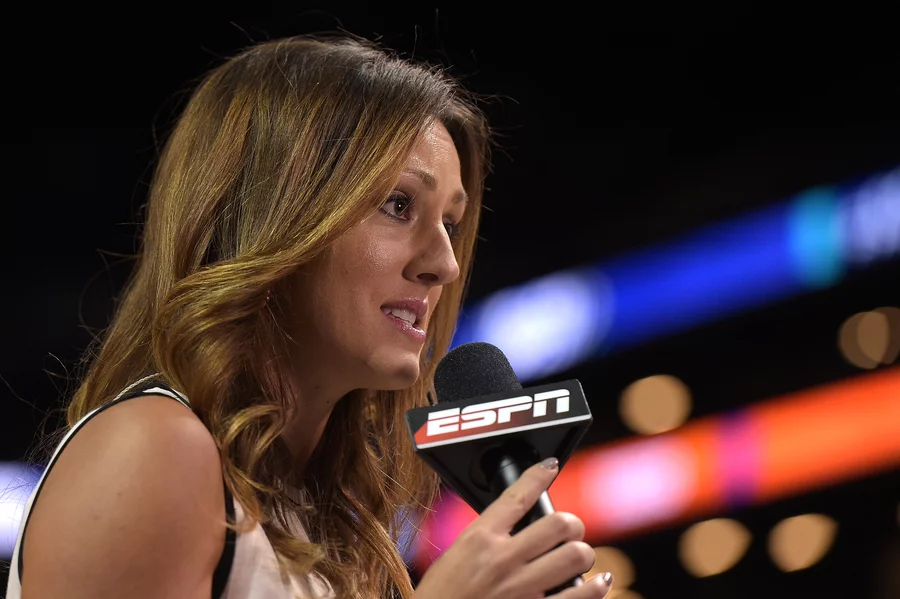
Lance King/Getty Images
ESPN college basketball and football reporter Allison Williams has joined a small minority of workers who have quit or been fired from their jobs over a vaccine mandate.
“I have been denied my request for accommodation by ESPN and the Walt Disney Company, and effective next week, I will be separated from the company,” she said in a video posted to Instagram on Friday.
ESPN’s parent company, Disney, had announced a vaccine mandate over the summer with a deadline of this Friday, Oct. 22.
In early September, Williams shared on Twitter that she’d decided not to get a COVID-19 vaccine while she and her husband were trying to have a second child.
“Taking the vaccine at this time is not in my interest,” she wrote.
The CDC has urged people who are pregnant or might become pregnant to get vaccinated, saying there is currently no evidence showing COVID-19 vaccines cause fertility problems and no data pointing to an increased risk of miscarriage among people who received an mRNA vaccine during pregnancy.
In the Instagram video, Williams spoke of her medical apprehensions about receiving the vaccine and added, “I am also so morally and ethically not aligned with this.”
“Ultimately, I cannot put a paycheck over principle, and I will not sacrifice something that I believe and hold so strongly to maintain a career,” she said in the video. “I’m going to pray things get better and that I can see you on the television set in some capacity in some stadium, covering some game soon.”
Williams, who had reported for ESPN since 2011, acknowledged she’s not the only one walking away from a career or a profession they love.
Hundreds of hospital workers have quit rather than get vaccinated, but they represent only a tiny fraction of employees overall. For example, Duke Health in North Carolina reported it had fired just 20 people out of a workforce of 23,000.
Meanwhile, United Airlines said it is terminating a couple of hundred of its 67,000 employees who did not comply with the airline’s vaccine mandate. Other employers that have imposed vaccine mandates are also reporting compliance rates topping 90%.

北美法律公益讲座安排
时间:周二到周五 晚间
5:30-7:00(西部)
8:30-9:30(东部)
周二: 遗嘱和资产传承(蒋律师&Joanna)
周三: 数据泄露和个人身份保护&事业机会说明会
周四: 婚姻和家庭法(主讲周律师)
周五:企业法律问题公益讲座(主讲人:蒋律师&Joanna)& 事业机会说明会
Zoom 6045004698,
密码:进群获取

Veteran police officer resigns over vaccine mandate in chronically understaffed department
The department has chronically been understaffed and more officers could resign over the mandate
By Emma Colton | Fox News
9/21/2021
A nearly 30-year police veteran in California resigned over San Jose’s vaccine mandate as the police force continues struggling with chronic understaffing.
“First of all, it’s my religious belief. I also believe I’ve been given a choice about what to do with my body,” Sgt. David Gutierrez said after he resigned from the San Jose Police Department this weekend, KPIX reported.
Gutierrez spent 23 years with the San Jose Police Department working as a homicide detective, internal affairs investigator and patrol supervisor, before retiring in 2019. He then returned to the force as a reserve officer.
Gutierrez worked his last shift at the department on Saturday, and said he sent a letter to the city manager on Monday denouncing the city’s vaccine mandate, which requires city employees to show proof of vaccination or get a medical exemption. Those who don’t comply face disciplinary action, such as termination.
“Disciplinary action is when you have done something wrong,” Gutierrez said, according to NBC Bay Area. “I have done nothing wrong – by making a choice not to be vaccinated why would you be disciplined?”
Gutierrez added that he is not anti-vaccine and would be open to the city testing him on a weekly basis instead of enforcing the vaccine or getting a medical exemption.
“I’m not anti-vaccine. I don’t tell people, ‘You shouldn’t get it.’ But when it comes to my body, it’s my choice about what I want to put in my body,” Gutierrez said.
He sent his resignation letter ahead of the city’s Sept. 30 deadline for employees to get the vaccine, and said more officers could also walk off the job amid the department already facing understaffing issues.
“We are already understaffed and can’t afford to lose more,” Gutierrez said.
“If they let go police officers who’ve been here five years, 10 years, 15 years, you can hire somebody else, but you’re not going to hire that experience though,” he added.
A recent audit examining the last 10 years of the police department found the force has heavily relied on overtime as it struggles with understaffing.
About 200 officers in the department have so far asked for exemptions, many of which are for religious purposes. But the Democratic mayor, Sam Liccardo, says the vaccine mandate is overall working and doesn’t anticipate an exodus from the force.
“This is certainly for the protection of the individual members of our city team. But it’s also, critically, for the safety of our entire community because we know, obviously, first responders are out there interacting [with the public] every day,” Liccardo said, according to KPIX.
Northern NY hospital to stop delivering babies after resignations over Covid-19 vaccine
BY Christine Vendel
9/12/2021
A hospital in New York plans to stop delivering babies later this month because too many maternity workers resigned rather than get the Covid-19 vaccine.
Lewis County Health System Chief Executive Officer Gerald R. Cayer announced at a news conference Friday afternoon that the maternity department would be closed on Sept. 25 until they can find enough vaccinated nurses to safely reopen it.
Cayer told reporters in Lowville, is the North Country of New York state, that seven of the 30 people who have resigned from the hospital worked in the maternity department, according to the news site NNY360.
Seven additional maternity workers have not said whether or not they will get their first vaccine shot by Sept. 27, which is the deadline set by the state for healthcare workers to get at least one shot, according to the news site.
The health system has a higher than average percentage of its staff vaccinated, Cayer told reporters, with 464 employees vaccinated out of 650, or 73 percent.
But there are still 165 employees who have not yet shared their decision with hospital management, WWNY television news reported.
Medical services in five other departments may have to be cut back as well if more staff members resign because they refuse to be vaccinated
“It just is a crazy time,” Mr. Cayer said, according to NNY360, “It’s not just LCHS-centric. Rural hospitals everywhere are really trying to figure out how we’re going to make it work.”
“If you don’t have staff, how do you deliver the service? That’s what I’m going to be talking about,” Cayer said.
The Health System is one of only two county-owned hospitals left in the state and is the largest employer in the county.




